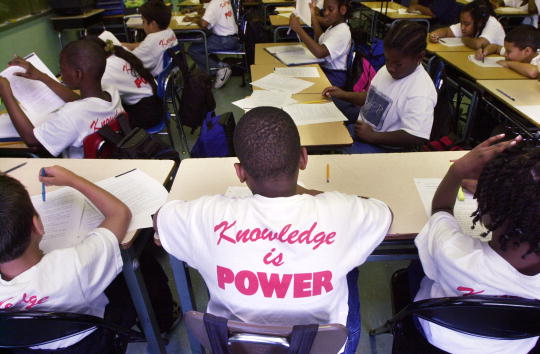Report: Fixing Education Disparities Is a Public Safety Strategy

Chris Hondros / Getty/Newsmakers
Focusing on educational disparities in the District would help reduce crime, according to a report issued today by D.C. think tank Justice Policy Institute. According to the report, D.C.’s high school dropouts are more likely to have prison records. It went on to show that states that have increased the money they spend on higher education have also seen their violent crime rates decline.
The think tank, whose mission is to reduce the incarceration rate, recommends spending more money on parks, mentoring and schools and less money on courts and policing. They also recommend revising school policies to keep kids in school.
Researchers found the same stark disparities we’ve examined when it comes to education levels in D.C.’s wards; for instance, one-fifth of Ward 8 adults haven’t completed high school. But the report also breaks down formal education levels of D.C.’s adults by race. Nearly all white adults in D.C. — 99 percent of them — have a high school diploma or higher. For African Americans, 80 percent of adults have completed high school, while 57 percent of Hispanic adults have high school diplomas.
*Source: Justice Policy Institute
“At the same time that communities of color face the greatest barriers in education in Washington, D.C.,” the report’s authors write, “they are also disproportionately held in D.C.’s jails and under the supervision of the Department of Youth and Rehabilitative Services (DYRS).” More than 52 percent of D.C.’s black adults without high school diplomas have criminal records. Half of the juvenile offenders under DYRS supervision in 2011 were from predominately black Wards 7 and 8.
Why do students drop out? WAMU 88.5′s Kavitha Cardoza has been examining D.C.’s dropout crisis, reporting that “students don’t drop out of school for any one reason. It’s usually a complicated mix, including individual traits, home life as well as school and neighborhood characteristics.” The top reasons dropouts said they left school include: classes were not interesting; missing too many school days and being unable to catch up; spending time with people who were not interested in school; having too much freedom and not enough rules in their lives; and failing in school.





